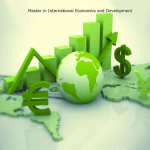International Economics and Development | Complutense University of Madrid
The Master of International Economics and Development is one of the few postgraduate programs in Spain with a plural approach. It provides theoretical and empirical analysis of capitalism at world level, with special attention to peripheral and underdeveloped areas, and from different approaches of political economy.
How does the programme provide content to ensure students achieve an understanding of a reasonably diverse set of perspectives on understanding economies?
It is a pluralist programme in which different heterodox theoretical approaches, such as Post-Keynesian (Kalecki-Minsky) or Marxian, are used, so students will be familiar of this heterogeneity of Economics, considered as Political Economy.
How does the programme ensure students understand the interaction between economic and ecological systems?
The Master includes a subject on “Ecological Economy and Sustainable Development”, which indeed allow students to know this interaction, complemented as well with “Political Economy of Energy” and “Spatial Analysis of Territorial Imbalances”.
How does the programme ensure students understand how to critically explore real-world evidence, both qualitative and quantitative?
Because there is a mix of qualitative and quantitative approaches of the world economy. Thus, the programme includes subjects aiming at providing theoretical tools, others have a methodological character, together with quantitative techniques, and also empirical analysis of both the different dimensions and regions of the economic system. However, it is a programme not fundamentally based on Econometrics, albeit this is included, but rather, an emphasis is placed on the structural analysis of capitalism and underdevelopment
What pedagogical approaches does the programme use to ensure that students examine the historical context, assumptions and values in all economic thinking?
Every empirical subjects include a historical framework in which to grasp the particularities of the issue, either for regional analysis (Asia, Africa, etc.) or for the dimensions of the economy (trade, finance, production).
How does the department ensure that the teaching culture and capacity to deliver economic pluralism are continually improving?
Every year, students provide a feedback on the Master, which is as well evaluated by the Ministry in relation to the contents, exams, research, etc.
Other information:
This program is taught by the unit of International Political Economy and Development within the Department of Applied Economics, Structure and History, which has a wide and long experience in the study of the world economic structure from a heterodox and historical-structural analytical perspective. The group of professors have extensive teaching and research experience, with publications in heterodox academic journals such as Cambridge Journal of Economics, Development & Change, Review of Radical Political Economics, Science & Society, Capital & Class, Latin American Perspectives, New Political Economy or Globalizations.
Country:
Spain
University:
Complutense University of Madrid
Course name:
International Economics and Development
Department/school:
Faculty of Economic and Business Administrative Sciences
Course level:
Taught Masters
Course language:
Spanish

 all programmes
all programmes